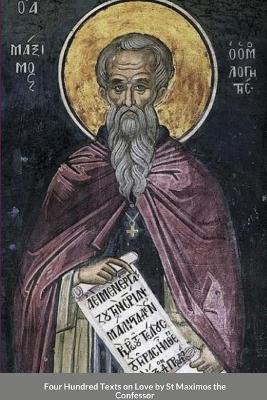Four Hundred Texts on Love by St Maximos the Confessor

Four Hundred Texts on Love by St Maximos the Confessor
Maximus the Confessor (Greek: Μάξιμος ὁ Ὁμολογητής), also known as Maximus the Theologian and Maximus of Constantinople (c. 580 - 13 August 662), was a Christian monk, theologian, and scholar. In his early life, Maximus was a civil servant, and an aide to the Byzantine Emperor Heraclius. However, he gave up this life in the political sphere to enter into the monastic life. Maximus had studied diverse schools of philosophy, and certainly what was common for his time, the Platonic dialogues, the works of Aristotle, and numerous later Platonic commentators on Aristotle and Plato, like Plotinus, Porphyry, Iamblichus, and Proclus. When one of his friends began espousing the Christological position known as Monothelitism, Maximus was drawn into the controversy, in which he supported an interpretation of the Chalcedonian formula on the basis of which it was asserted that Jesus had both a human and a divine will. Maximus is venerated in both the Eastern Orthodox and Roman Catholic churches. He was eventually persecuted for his Christological positions; following a trial, his tongue and right hand were mutilated. He was then exiled and died on 13 August 662, in Tsageri in present-day Georgia. However, his theology was upheld by the Third Council of Constantinople and he was venerated as a saint soon after his death.
PRP: 102.59 Lei
Acesta este Prețul Recomandat de Producător. Prețul de vânzare al produsului este afișat mai jos.
92.33Lei
92.33Lei
102.59 LeiLivrare in 2-4 saptamani
Descrierea produsului
Maximus the Confessor (Greek: Μάξιμος ὁ Ὁμολογητής), also known as Maximus the Theologian and Maximus of Constantinople (c. 580 - 13 August 662), was a Christian monk, theologian, and scholar. In his early life, Maximus was a civil servant, and an aide to the Byzantine Emperor Heraclius. However, he gave up this life in the political sphere to enter into the monastic life. Maximus had studied diverse schools of philosophy, and certainly what was common for his time, the Platonic dialogues, the works of Aristotle, and numerous later Platonic commentators on Aristotle and Plato, like Plotinus, Porphyry, Iamblichus, and Proclus. When one of his friends began espousing the Christological position known as Monothelitism, Maximus was drawn into the controversy, in which he supported an interpretation of the Chalcedonian formula on the basis of which it was asserted that Jesus had both a human and a divine will. Maximus is venerated in both the Eastern Orthodox and Roman Catholic churches. He was eventually persecuted for his Christological positions; following a trial, his tongue and right hand were mutilated. He was then exiled and died on 13 August 662, in Tsageri in present-day Georgia. However, his theology was upheld by the Third Council of Constantinople and he was venerated as a saint soon after his death.
Detaliile produsului











